Raising Lazarus
Close Reading a Text. The gospel of John is a very nuanced gospel. Every sentence has an important reason for being there. As we read Chapter 11, let's practice closely reading the text and reflecting every few sentences.
The text is taken from the English Standard Version of the Bible.
Message sent to Jesus
11 Now a certain man was ill, Lazarus of Bethany, the village of Mary and her sister Martha. 2 It was Mary who anointed the Lord with ointment and wiped his feet with her hair, whose brother Lazarus was ill. 3 So the sisters sent to him, saying, “Lord, he whom you love is ill.” 4 But when Jesus heard it he said, “This illness does not lead to death. It is for the glory of God, so that the Son of God may be glorified through it.”
5 Now Jesus loved Martha and her sister and Lazarus. 6 So, when he heard that Lazarus was ill, he stayed two days longer in the place where he was.
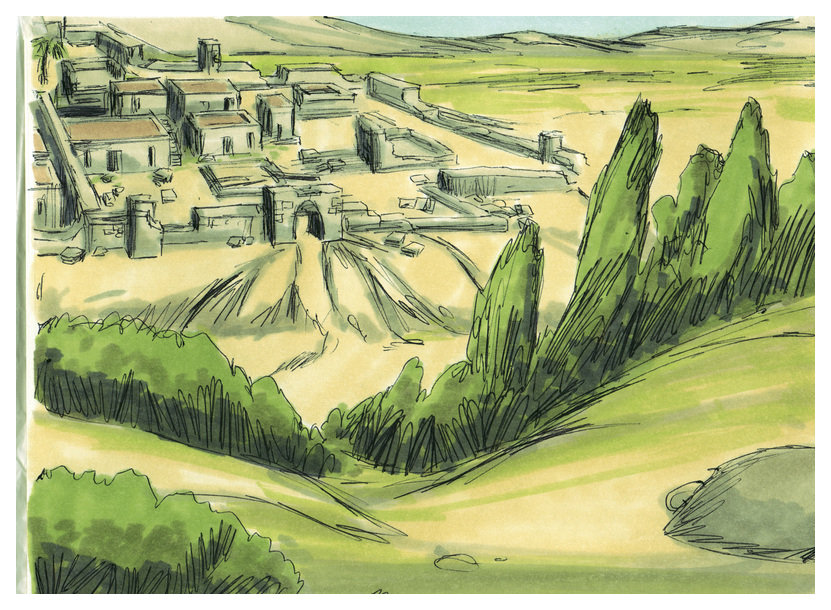
By Distant Shores Media/Sweet Publishing, CC BY-SA 3.0, https://commons.wikimedia.org/w/index.php?curid=18888543
In verse 2, does this reference the story in Luke 7:38? Scholars have different views. What do you think?
In verse 5, the text assures us that Jesus loved Martha, Mary, and Lazarus. Why add this note? Could it seem callous that he did not immediately go to help Lazarus? What is Jesus' explanation for why he stays in verse 4? Do you think he knows what is going to happen? Why does he say Lazarus' illness will be for the glory of God?
Disciples Advise Jesus
7 Then after this he said to the disciples, “Let us go to Judea again.” 8 The disciples said to him, “Rabbi, the Jews were just now seeking to stone you, and are you going there again?” 9 Jesus answered, “Are there not twelve hours in the day? If anyone walks in the day, he does not stumble, because he sees the light of this world. 10 But if anyone walks in the night, he stumbles, because the light is not in him.”
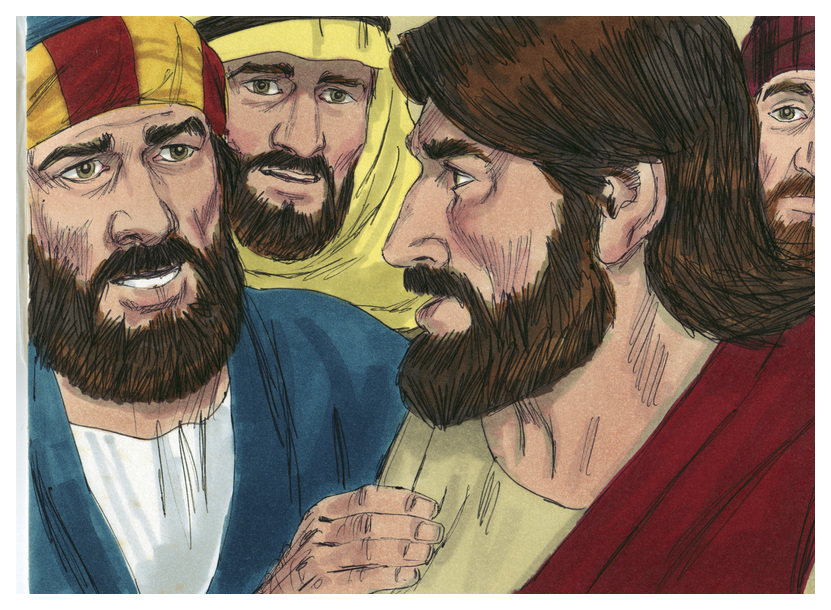
By Distant Shores Media/Sweet Publishing, CC BY-SA 3.0, https://commons.wikimedia.org/w/index.php?curid=18888551
In verse 8, why do the disciples not want Jesus to go to Judea?
In verse 9-10, how does Jesus' response answer their question? What does his statement mean?
Discussion Question: In the previous chapter of John, John 11, Jesus says he is the good shepherd and that the good shepherd lays down his life for the sheep. Does Jesus fear sacrificing himself for the good of others? Do the disciples fear it?
Jesus says Lazarus Asleep

By Distant Shores Media/Sweet Publishing, CC BY-SA 3.0, https://commons.wikimedia.org/w/index.php?curid=18888551
In verse 11, why does Jesus refer to death as sleep when he clearly is aware that Lazarus is dead?
In verse 12, do Jesus' students always understand what he is talking about? Why not?
In verse 13-14, why does he first try to get his disciples to think of Lazarus as asleep and only later more literally say he is dead?
In verse 15, why does Jesus say he is glad he wasn't there when Lazarus died? Is Jesus being callous? Does he know what he's going to do? Do the disciples understand what he is going to do?
In verse 16, Does Thomas the disciple think that following Jesus will lead to resurrection and life in this story or to further death? Are the disciples supportive of Jesus' actions?
Martha
17 Now when Jesus came, he found that Lazarus had already been in the tomb four days. 18 Bethany was near Jerusalem, about two miles off, 19 and many of the Jews had come to Martha and Mary to console them concerning their brother. 20 So when Martha heard that Jesus was coming, she went and met him, but Mary remained seated in the house. 21 Martha said to Jesus, “Lord, if you had been here, my brother would not have died. 22 But even now I know that whatever you ask from God, God will give you.” 23 Jesus said to her, “Your brother will rise again.” 24 Martha said to him, “I know that he will rise again in the resurrection on the last day.” 25 Jesus said to her, “I am the resurrection and the life. Whoever believes in me, though he die, yet shall he live, 26 and everyone who lives and believes in me shall never die. Do you believe this?” 27 She said to him, “Yes, Lord; I believe that you are the Christ, the Son of God, who is coming into the world.”
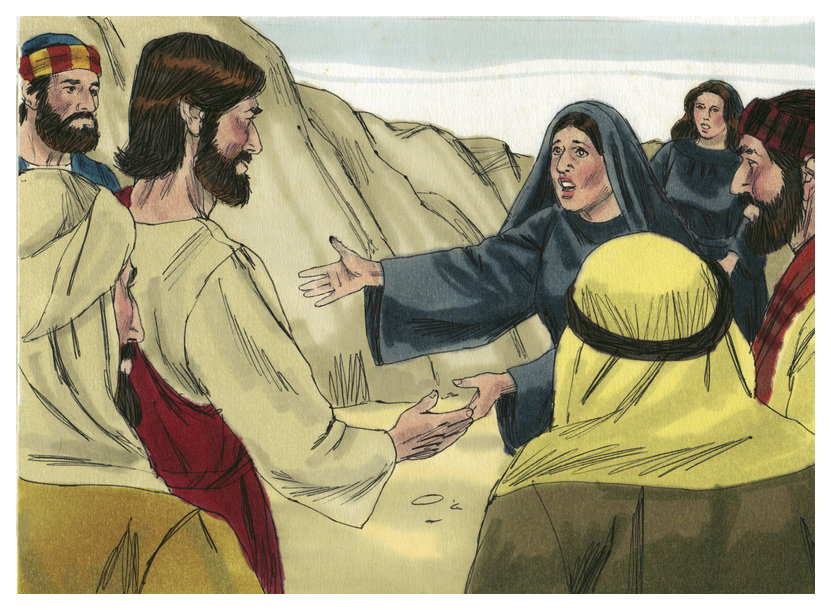
By Distant Shores Media/Sweet Publishing, CC BY-SA 3.0, https://commons.wikimedia.org/w/index.php?curid=18888553
In verse 21, Is Martha's initial greeting blaming Jesus for Lazarus' death?
In verse 22, why does Martha become more hopeful?
Does verse 23 indicate that Jesus knows what will happen?
In verse 24, what is Martha's understanding of Jesus's statement?
In verse 25-26, how does Jesus correct Martha's theology?
How does Martha change from verse 21 to her statement of faith in verse 27?
Martha returns to Mary
28 When she had said this, she went and called her sister Mary, saying in private, “The Teacher is here and is calling for you.” 29 And when she heard it, she rose quickly and went to him. 30 Now Jesus had not yet come into the village, but was still in the place where Martha had met him. 31 When the Jews who were with her in the house, consoling her, saw Mary rise quickly and go out, they followed her, supposing that she was going to the tomb to weep there.
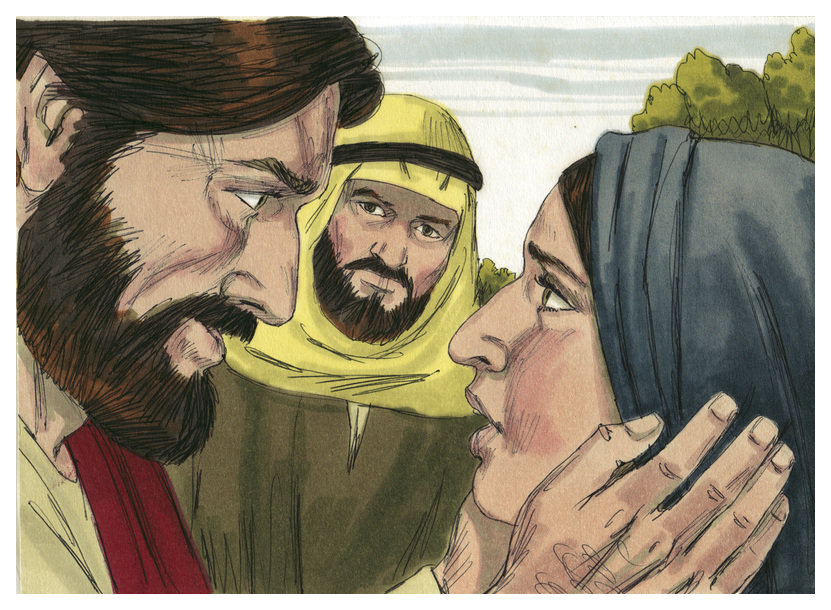
By Distant Shores Media/Sweet Publishing, CC BY-SA 3.0, https://commons.wikimedia.org/w/index.php?curid=18888555
Why does Martha call Jesus "the Teacher?" What does this show about her relationship with Jesus?
Why does Mary get up quickly? Do those comforting her understand where she is going?
Mary comes to Jesus
32 Now when Mary came to where Jesus was and saw him, she fell at his feet, saying to him, “Lord, if you had been here, my brother would not have died.” 33 When Jesus saw her weeping, and the Jews who had come with her also weeping, he was deeply moved in his spirit and greatly troubled. 34 And he said, “Where have you laid him?” They said to him, “Lord, come and see.” 35 Jesus wept. 36 So the Jews said, “See how he loved him!” 37 But some of them said, “Could not he who opened the eyes of the blind man also have kept this man from dying?” 38 Then Jesus, deeply moved again, came to the tomb....
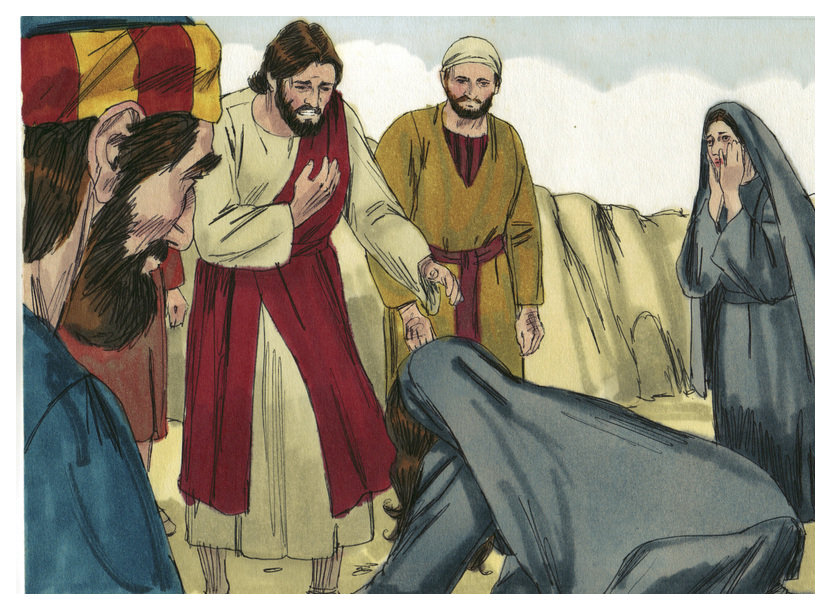
By Distant Shores Media/Sweet Publishing, CC BY-SA 3.0, https://commons.wikimedia.org/w/index.php?curid=18888558
In verse 32, Does Mary welcome Jesus or blame him?
In verse 33, everyone is weeping. Does anyone believe that Jesus can do anything to help the situation? The Greek word here being translated "deeply moved" is actually to feel displeasure or a rebuke and the word translated "greatly troubled" means unsettled. Why is Jesus feeling this way?
Of everyone in the story so far, who has any faith that Jesus can help the situation: a) his disciples, b) Martha, c) Mary, or d) the Jews comforting the family?
In verse 35, why does Jesus weep? A different Greek word is used here for weeping than when Mary weeps. It's not clear why the author chose a different word, but do you imagine there might be a reason for the difference, in other words, are Mary and Jesus weeping for different reasons?
In verse 36, the Jews say Jesus loved Lazarus in the past tense. How might this show a difference of thought between Jesus and the other people present? The Jews also say that Jesus was capable of healing a blind man, couldn't he have done something to keep Lazarus from dying. Do they have any faith Jesus can do anything now?
In verse 38, the Greek word here being translated "deeply moved" is actually to feel displeasure or a rebuke. Why is Jesus feeling this way? What is going on around him that he is not pleased with?
...It was a cave, and a stone lay against it. 39 Jesus said, “Take away the stone.” Martha, the sister of the dead man, said to him, “Lord, by this time there will be an odor, for he has been dead four days.” 40 Jesus said to her, “Did I not tell you that if you believed you would see the glory of God?” 41 So they took away the stone....
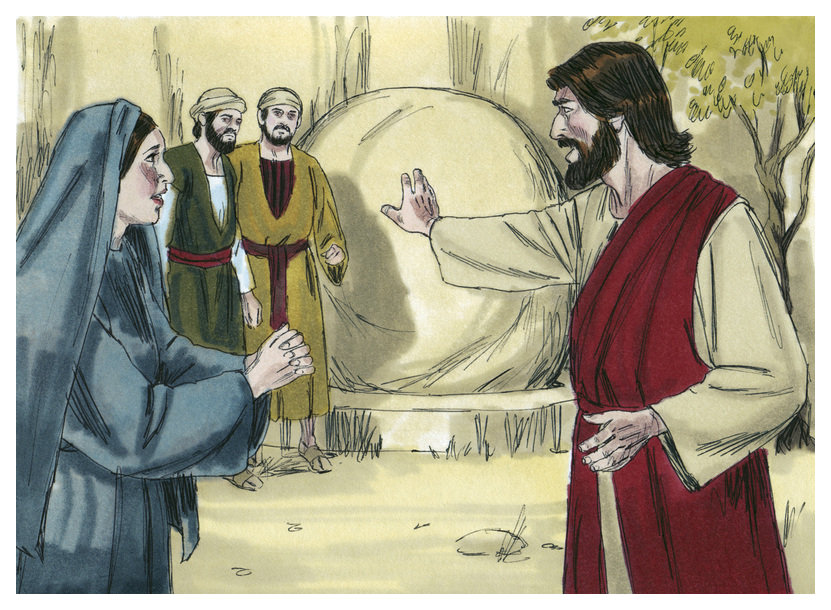
By Distant Shores Media/Sweet Publishing, CC BY-SA 3.0, https://commons.wikimedia.org/w/index.php?curid=18888560
In verse 39, Jesus gives a command. Do people want to follow the command? What does this verse show about Martha's faith?
In verse 40, how does Jesus' statement rebuke Martha's statement in the previous verse?
In verse 41, they finally obey Jesus' command. Does this indicate a change of thought?
Lazarus Awakens From Sleep
...And Jesus lifted up his eyes and said, “Father, I thank you that you have heard me. 42 I knew that you always hear me, but I said this on account of the people standing around, that they may believe that you sent me.” 43 When he had said these things, he cried out with a loud voice, “Lazarus, come out.” 44 The man who had died came out, his hands and feet bound with linen strips, and his face wrapped with a cloth. Jesus said to them, “Unbind him, and let him go.”
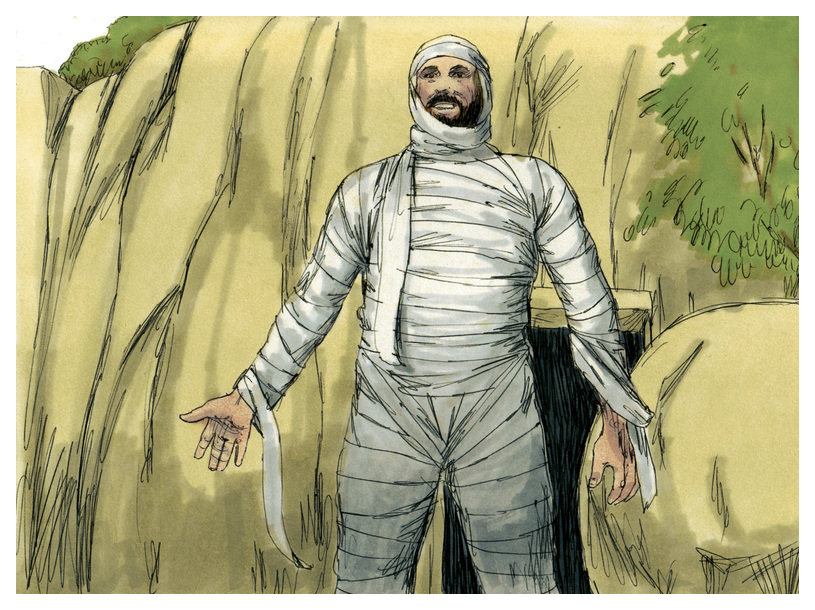
By Distant Shores Media/Sweet Publishing, CC BY-SA 3.0, https://commons.wikimedia.org/w/index.php?curid=18888571
In verse 41 and 42, Is Jesus confident? Why does he begin with giving thanks in this tragic situation? Did Jesus see the situation as tragic? Look again at verse 4 of this chapter.
In verse 42, what does Jesus know? What is he hoping the people around him will know? What is he hoping they will believe?
In verse 44, do you see anything metaphorical in Jesus statement, or is it just literal?
Discussion Questions
Was close reading this text helpful? What did you learn? What questions do you still have?
Was Jesus always certain about the outcome of this event? How did that contrast the viewpoint of the others around him? How will the viewpoint of the disciples, Mary, Martha, and the other Jews have to change in light of Lazarus being alive?
Instructions
In Level 4, you should also read the epilogue of the story. We won't close read this section, but will have some discussion questions at the end.
The Sanhedrin
45 Many of the Jews therefore, who had come with Mary and had seen what he did, believed in him, 46 but some of them went to the Pharisees and told them what Jesus had done. 47 So the chief priests and the Pharisees gathered the council and said, “What are we to do? For this man performs many signs. 48 If we let him go on like this, everyone will believe in him, and the Romans will come and take away both our place and our nation.” 49 But one of them, Caiaphas, who was high priest that year, said to them, “You know nothing at all. 50 Nor do you understand that it is better for you that one man should die for the people, not that the whole nation should perish.” 51 He did not say this of his own accord, but being high priest that year he prophesied that Jesus would die for the nation, 52 and not for the nation only, but also to gather into one the children of God who are scattered abroad. 53 So from that day on they made plans to put him to death.
54 Jesus therefore no longer walked openly among the Jews, but went from there to the region near the wilderness, to a town called Ephraim, and there he stayed with the disciples.
55 Now the Passover of the Jews was at hand, and many went up from the country to Jerusalem before the Passover to purify themselves. 56 They were looking for Jesus and saying to one another as they stood in the temple, “What do you think? That he will not come to the feast at all?” 57 Now the chief priests and the Pharisees had given orders that if anyone knew where he was, he should let them know, so that they might arrest him.
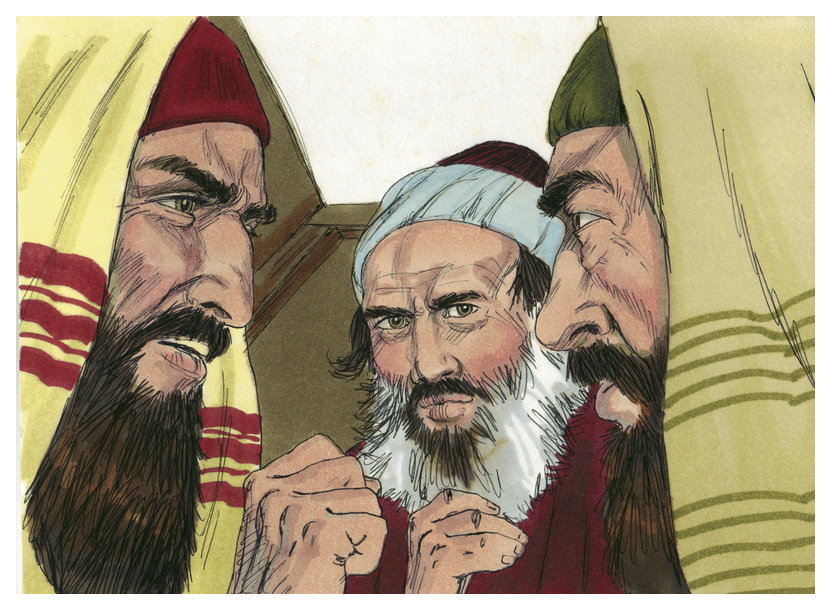
By Distant Shores Media/Sweet Publishing, CC BY-SA 3.0, https://commons.wikimedia.org/w/index.php?curid=18888577
Mary anoints Jesus
12 Six days before the Passover, Jesus therefore came to Bethany, where Lazarus was, whom Jesus had raised from the dead. 2 So they gave a dinner for him there. Martha served, and Lazarus was one of those reclining with him at table. 3 Mary therefore took a pound of expensive ointment made from pure nard, and anointed the feet of Jesus and wiped his feet with her hair. The house was filled with the fragrance of the perfume. 4 But Judas Iscariot, one of his disciples (he who was about to betray him), said, 5 “Why was this ointment not sold for three hundred denarii and given to the poor?” 6 He said this, not because he cared about the poor, but because he was a thief, and having charge of the moneybag he used to help himself to what was put into it. 7 Jesus said, “Leave her alone, so that she may keep it for the day of my burial. 8 For the poor you always have with you, but you do not always have me.”
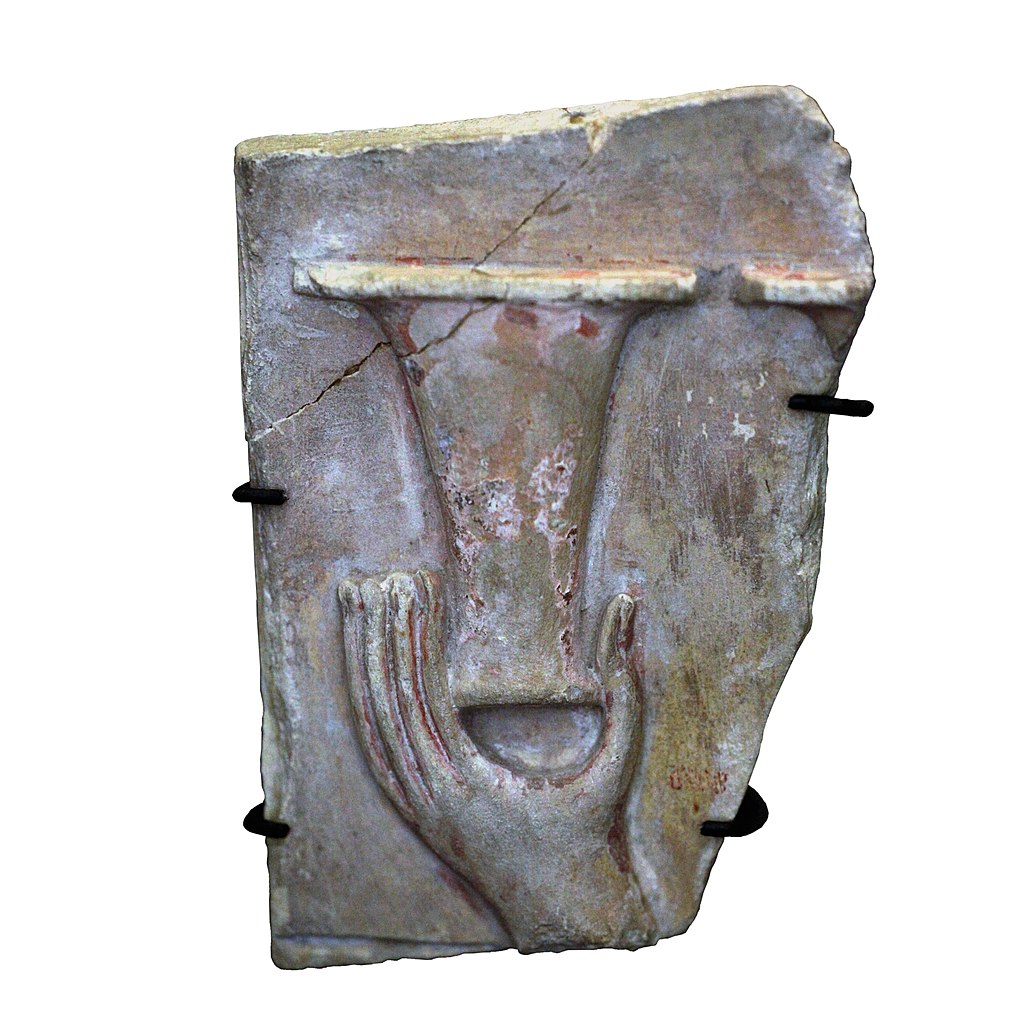
Rama, Public domain, via Wikimedia Commons
Epilogue
9 When the large crowd of the Jews learned that Jesus was there, they came, not only on account of him but also to see Lazarus, whom he had raised from the dead. 10 So the chief priests made plans to put Lazarus to death as well, 11 because on account of him many of the Jews were going away and believing in Jesus.
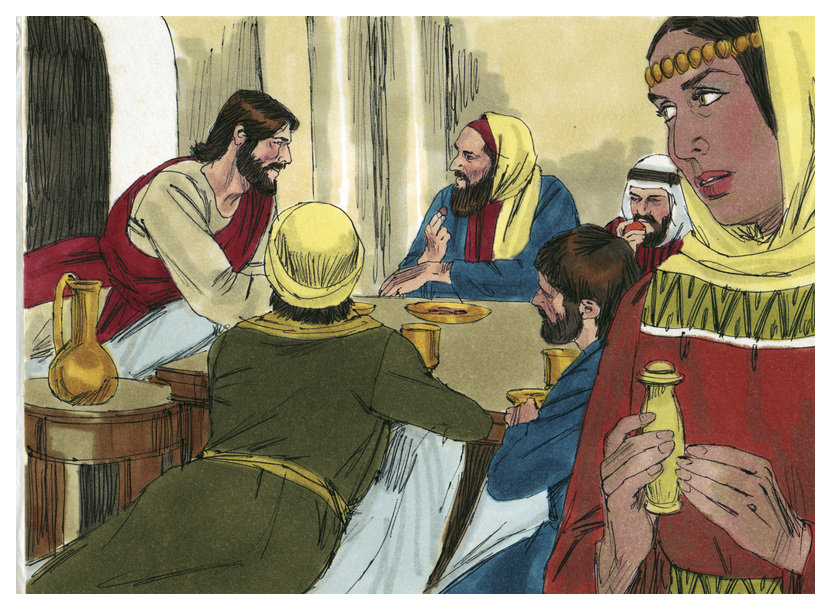
By Distant Shores Media/Sweet Publishing, CC BY-SA 3.0, https://commons.wikimedia.org/w/index.php?curid=18888582
Discussion Questions
What was Jesus' reward for helping Lazarus? Do you think he knew that raising Lazarus would set off a chain of events that would lead to his death? Why does he already refer to his own burial in verse 7?
What do you think of Jesus' statement that "the poor you always have with you?" Do you think he was being callous to poor people?
What do you think about the political justification for Jesus' death given by the council?
What do you think about the plot to kill Lazarus?
“Scripture quotations are from The ESV® Bible (The Holy Bible, English Standard Version®), copyright © 2001 by Crossway, a publishing ministry of Good News Publishers. Used by permission. All rights reserved.”